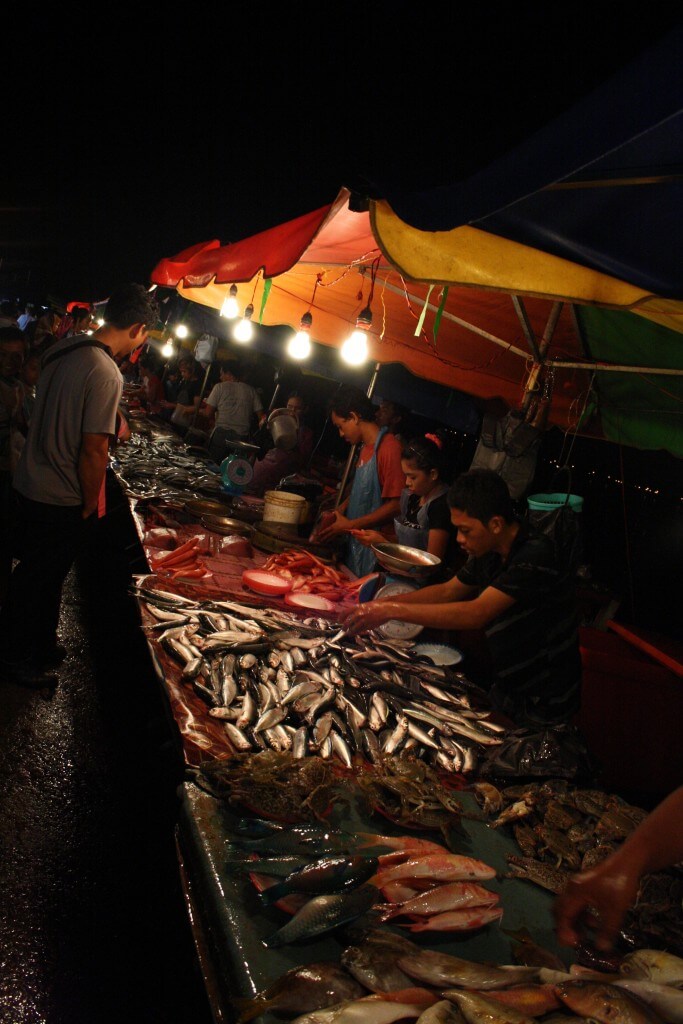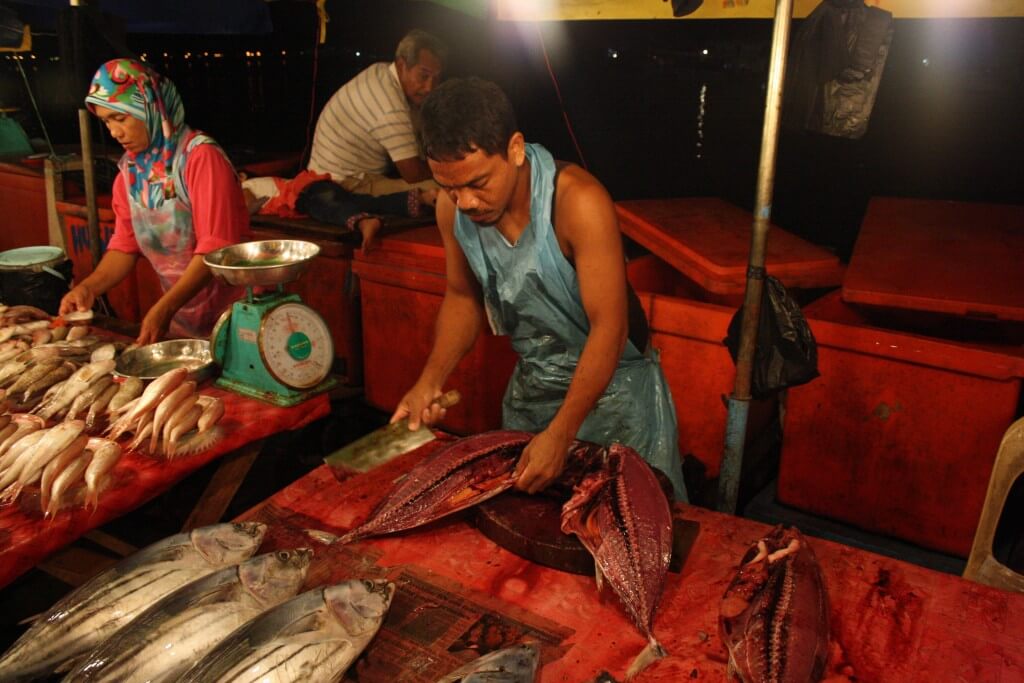Emma Garnett is an ecologist who is usually happiest when hiking through mountains. After graduating with a first in Natural Sciences at Cambridge in 2011, she spent two years studying in five different countries for a Masters in Applied Ecology. She has a keen interest in marine conservation and for her thesis spent four months on the Galápagos assessing the importance of mangrove habitats for juvenile fish communities. These experiences gave her an international perspective on conservation issues and sustainability, as well as a love of travelling, learning languages and Latin dancing. She teaches undergraduates at the University of Cambridge and was awarded the Janet Moore prize for supervising in Zoology. She has worked for organisations including IUCN and Zoological Society London, and is currently working for Microsoft Research.
Plenty more fish in the sea?
I had never seen so many dead fish in my life; the pavements were wet with the evening’s rain and fish blood.
Lonely Planet had reliably informed me that this night market in Kota Kinabalu, Malaysia, was one of the best in South East Asia. The ordinary-looking stalls we had watched being set up in the afternoon were transformed by the darkness and produce into something extraordinary, almost magical.
The variety and colours of the seafood was astonishing, a combination of science exhibit and art gallery. In comparison the meat counters were monotonous and dull; most of the meat we eat is chicken, pig, sheep or cow: four species. The seafood stalls contained dozens of different species from many different taxa: fish, molluscs, crustaceans, echinoderms. They were unnervingly beautiful, many fish perfectly streamlined with large bodies that, even dead on a table, conveyed power. Fish eyes stared from plates alongside comical looking squid and prawns larger than I had thought possible. The tail of a yellow fin tuna stood erect on the table like a morbid statue.
The rows upon rows of stalls with raw and barbecued fish underlined to me the appeal of seafood: a food stuff that does not have to be bred, grazed and grown but can be both hunted and cooked within hours. Let us hope that these species survive ecologically and economically. It would be a poorer world and platter without them.
***
Unfortunately, the sheer volume and abundance of produce at sea food stalls across the world make it difficult to believe that the oceans are being stripped, dredged and trawled bare. Quite simply, we are now removing fish at a faster rate than they can reproduce and replace themselves.
The oceans were once believed to be limitless, the British eighteenth century ecologist Thomas Huxley famously stated in 1882 that probably ‘all the great sea fisheries are inexhaustible’. Their former abundance would have been astonishing to modern eyes: when Europeans first arrived in North America it was possible to fish for cod using only baskets they were so plentiful, and shoals of herring miles long off British coasts were common in the 18th century.
However, the proverbial tide has turned and there are too many fish out of water. Since the 1950s more and more boats have been chasing fewer and fewer fish across ever greater areas of the oceans. Annually, approximately 90 million tonnes of wild seafood are caught, but we have the global vessel capacity for 360 million tonnes (ref 1). Seafood consumption is only increasing globally due to the exponential growth of aquaculture, which brings its own environmental problems, primarily coastal habitat destruction and pollution.
Destructive practices such as bottom trawling, where nets large enough to contain a jumbo jet are dragged across the ocean, indiscriminately catch everything in their path and also destroy the marine habitat. The consequences of bottom trawling on the seafloor have been likened to clear felling a rainforest.
Not only are we decimating the fish populations, but our exploitations are fundamentally changing the structure of the ecosystems. Predatory fish at the top of the food chain, such as tuna, shark and swordfish, are culinary favourites and have been disproportionately reduced by over fishing (ref 2). With their predators declining, jellyfish are thriving in the empty, warmer oceans, with NGOs warning that our grandchildren will be eating jellyfish burgers unless we protect marine life (ref 3). We are now ‘fishing down the food chain’, taking smaller and more herbivorous species, as well younger individuals. We are waging a war on fish, and we are winning (ref 4).
***
Three years after my time in Malaysia I am living in Kiel, a sprawling, industrial city on the German Baltic coast. One warm evening in late summer I walk along the fjord, waiting for the music at the festival behind me to start. Looking into the water, at first I think I can see plastic bags, and curious, look closer. There are dozens upon dozens of jellyfish, floating in the brackish water. Small sprat nibble at vegetation on the harbour’s wall, completely dwarfed and outnumbered; a lone flounder, mottled orange and brown, swims past and out of sight. Suspended, pulsing, the jellyfish remain.
References
1) Eric van Doorne, personal communication, 2014
2) http://www.nature.com/nature/journal/v423/n6937/abs/nature01610.html
3) http://www.scientificamerican.com/gallery/a-jellyfish-burger/
4) Review by Daniel Pauly of Charles Clover’s book The End of the Line, 2009




Thank you so much. Having been delighted by so many reefs and reef fringes around the world do these un-numbered species now also face the fate of Martha? A pithy oversight and assessment of the relevant institutions and programmes in place would be very interesting.
It’s a familiar story isn’t it. Unimaginable abundance terminally depleted by strategic habitat change, and being finished off by industrial opportunist exploitation. The law of commons. Oversight hobbled and nobbled by vested interest and consumer markets. Hand-wringing and dithering because so many factors make choices difficult.
But is the damage done only to be understood too late by too few and in hindsight?
It is indeed a familiar – and depressing – story. Your final question is a very valid one, John.
It would help if more of those who are concerned, and don’t need to eat the dwindling stocks of fishes, refrained from doing so.
Emma Garnett writes:”It would be a poorer world and platter without them.”
Never mind ‘a poorer platter’ – filling that is what’s causing the ‘poorer world’.
Leave the fishes in the sea where they belong – don’t let’s gawp at them dead and dying on market stalls.
I think you have to recognise the importance of the “poorer platter” given the importance of seafood as a vital component of the diet of a significant proportion of humanity, particularly in developing nations. Simply leaving all the fish in the sea will mean starvation and poverty for millions.
The key point is we need to fish sustainably. This is not that hard to do in theory, but requires strict control and adherence to scientifically determined quotas, plus crucially it needs political will. Political will only arises out of public pressure and therefore we are all responsible for this if we do not pressurise our politicians (and the places we buy fish from) to ensure fishing is managed sustainably.
Buying fish and chips? Pick an MSC certified chippy, like my local in Helmsley (http://scottsfishandchips.co.uk/sustainable-fish-and-chips/)
Buying fish at the supermarket? -Check it is a species identified as being one that is currently being fished in a sustainable fashion from a well managed fishery (https://www.msc.org/cook-eat-enjoy/fish-to-eat)
Write to your MP.
If you’re not doing the first two at least then the situation is at least partly your fault.
Hugh – I agree. The oceans could providce vastly more food for the world, and potentially take some pressure off terrestrial habitat destruction if marine resources were allowed to recover. We really could have lots more food and lots more fish if we just got our act together.
I did say ‘and don’t need to eat the dwindling stocks of fishes…’, Hugh. Operative word ‘need’.
If your last sentence is directed to me (rather than those en masse reading the blog) – yes, I do do the last 2 points you mention.
Very true Emma. I never eat fish or seafood, given the state of our oceans.
p.s. Mark: have you seen Waitrose are planning to sell partridge and mallard in a push to sell more game? (metro newspaper today). A top target for your ‘no lead in food’ campaign I would have thought.
Very interesting about Waitrose – if the duck are to be sourced in this country, I wonder if Waitrose have checked to see if they have been shot using lead? Would they want to promote a food that had been obtained by illegal means?
Brining this right home, to now and political reality, the natural Capital Committee have pointed out that restoring British fish stocks could significantly increase the take (which was much higher in the past) and generate a benefit to cost of 6 to 1. As Defra & NFU are so obsessed with ‘food security’ this surely is a no brainer ? What better way to create the extra home grown food to offset the (minimal) reductions from the other NCC reccomendations like woodland close to towns and new wetland.
But the practicalities are obviously impossible – or are they ? What I’d do is ‘retire’ blocks of fishery in sequence for the years they take to recover – conserving the domestic markets and fishing skills. But what about the fishermen in the ‘retired’ sections ? That, I’d suggest is where the national fishing fleet comes in – they should be paid by the Government not to fish, but to monitor stocks. They’d see personally the stocks recovering and gain the skills needed for the new, completely different sustainable approach to fisheries management – and as the first ‘retired’ blocks came back into production the gap in fish supplies would first be filled, then start to rise.
Defra & NFU ‘food security’ sadly I fear is codswallop, you only have to look at acres of land covered by maize and solar farms to see how much food agri-industry?
‘Food security’ is a scare monger tactic to ensure plenty of agri-welfare subsidies for the agri-industry (not real farmers)?
Whilst Roderick’s offer is excellent, ‘no brainer’ – involving defra & NFU? A brain between them would be an improvement (who wrote the petition response, who did the risk assessment on the consequences of offering MA ‘pr’ as fact)?
Must agree with Marian: yes, leave the fish in the sea!!!!!!
We do not need to eat fish at all. They are not here to feed us but to live their own lives. What makes us think they are ours to remove from the oceans and stuff into our greedy mouths?
They feel pain and suffer horribly when removed from their habitat, all for our mindless pleasure. Surely we are mistaken in having convinced ourselves that it is our right to kill them.
Can we not live in harmony with all the creatures of the earth? Live and let live.